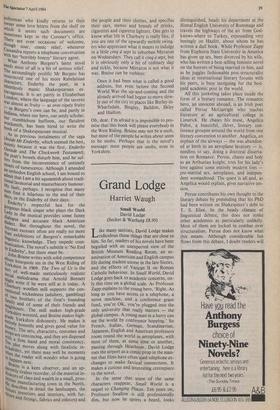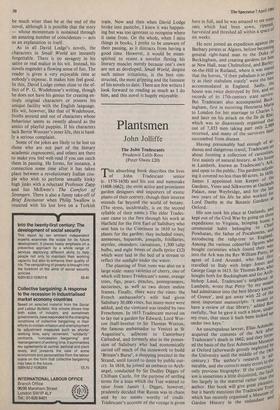Grand Lodge
David Lodge (Secker & Warburg £8.95)
Like many satirists, David Lodge makes ridiculous those things that are close to him. So far, readers of his novels have been beguiled with an unexpected view of the British Museum Reading Room, an ex- amination of American and English campus life during student unrest in the late Sixties, and the effects of Vatican II on Roman Catholic behaviour. In Small World, David Lodge goes back to academic concerns, on- ly this time on a global scale. As Professor Zapp explains to the young hero, 'Right. As long as you have access to a telephone, a xerox machine, and a conference grant fund, you're OK, you're plugged into the only university that really matters — the global campus. A young man in a hurry can see the world by conference hopping.' So French, Italian, German, Scandinavian, Japanese, English and American professors zoom round the world in aeroplanes, with most of them, at some time or another, passing through Heathrow. David Lodge uses the airport as a comic prop in the man- ner that films have often used telephone ex- changes to make farcical connections. It makes a curious and interesting centrepiece to the novel.
In the sense that some of the same characters reappear, Small World is a sequel to Changing Places. Ten years on, Professor Swallow is still professionally dim, but now he sports a beard, looks
distinguished, heads his department at the dismal English University of Rummage and travels the highways of the air from God- knows-where to Turkey, expounding very boringly on Hazlitt, about whom he has written a dull book. While Professor Zapp from Euphoria State University in America has given up sex, been divorced by his wife, who has written a best-selling feminist novel on the horrors of being married to him, and as he juggles fashionable post-structuralist ideas at international literary forums with his peers, is busy intriguing for the best- paid academic post in the world.
All this junketing takes place inside the form of a literary romance. The romantic hero, an innocent abroad, is an Irish poet called Persse McGarrigle who teaches literature at an agricultural college in Limerick. He chases his muse, Angelica Pabst, a beautiful, clever, literary con- ference groupee around the world from one literary convention to another. Angelica, an orphan of the airways — she was abandon- ed at birth in an aeroplane lavatory — is, needless to say, doing a doctoral disserta- tion on Romance. Persse, chaste and holy as an Arthurian knight, tries for his lady's love against some entirely modern foes pre-marital sex, aeroplanes, and indepen- dent womanhood. The quest is all and, as Angelica would explain, gives narrative ten- sion.
Persse contributes his own thought to the literary debate by pretending that his PhD had been written on Shakespeare's debt to T. S. Eliot. In the heady climate of linguistical debate, this does not strike other academics as particularly unlikely.
Most of them are locked in combat over structuralism. Persse does not know what
this means. Although considerable fun flows from this debate, I doubt readers will
be much wiser than he at the end of the novel, although it is possible that the story — whose momentum is sustained through an amazing number of coincidences — acts as an explanation in itself.
As in all David Lodge's novels, the characters in Small World are instantly forgettable. There is no savagery in his satire or real malice in his wit. Instead, his novels engender a flowing sense of fun. The reader is given a very enjoyable time at nobody's expense. It makes him feel good. In this, David Lodge comes close to the ef- fect of P. G. Wodehouse's writing, though he does not have his genius for creating en- tirely original characters or possess his unique facility with the English language. His wit, however, like that of Wodehouse, froths around and out of characters whose behaviour seems as sweetly absurd as the antics of playful puppies. If his characters lack Bertie Wooster's inner life, this is hard- ly a serious complaint.
Some of the jokes are likely to be lost on those who are not part of the literary academic cognoscenti, and others are there to make you feel well-read if you can catch them in passing. He forms, for instance, a connection some time after it has taken place between a revolutionary Italian cou- ple who wish to perform sexually kinky high jinks with a reluctant Professor Zapp and Ian McEwen's The Comfort of Strangers. There is also a funny take-off of Brief Encounter when Philip Swallow is reunited with his lost love on a Turkish train. Now and then when David Lodge broke into pastiche, I knew it was happen- ing but was too ignorant to recognise where it came from. On the whole, when I miss things in books, I prefer to be unaware of their passing, as it distracts from having a good time. However, it would be mean- spirited to resent a novelist flexing his literary muscles merely because one's own are not as developed. Small World, despite such minor irritations, is the best con- structed, the most gripping and the funniest of his novels to date. There are few writers I look forward to reading as much as I do him, and this novel is hugely enjoyable.











































 Previous page
Previous page